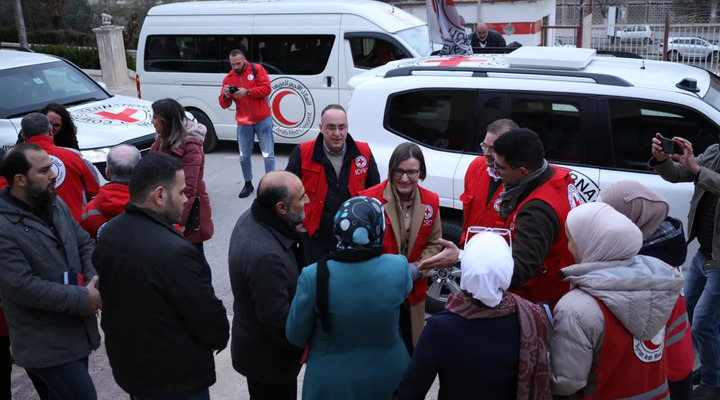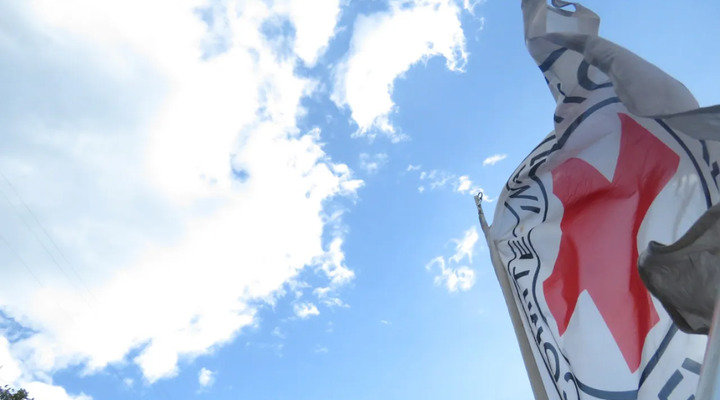Libya: Survivors mourn, call for humanitarian assistance, medicine, clean water
After devastating floods killed thousands of people in Libya’s northeast, survivors mourn family and friends that perished in the disaster. Thousands of people are displaced and need food, clean water, shelter, and medical supplies. Many are also desperate to have news of their missing loved ones.
“Some dead bodies were successfully identified, but other bodies were not because whole families were gone together,” said Libyan Red Crescent worker Hisham Abdullah. “So we’re talking about a terrible humanitarian situation.”
The ICRC has donated close to 6000 body bags, management of the dead kits and technical support, and is on its way to deliver, medicine, food, and non-food items to families affected by the floods. Medical support to affected health facilities will also be provided, as well as a forensics team to work on the management of the dead.
“We have provided medicine to some medical centers that were providing support to the wounded and sick of this catastrophe,” said ICRC Libya Head of Delegation Yann Fridez. “We are now planning for other activities with food, essential items and as well to support the work of authorities to reinstall safe water for the population.”
The ICRC donated medical items to Al Hawary hospital in Benghazi which is the focal hospital dispatching medical support to the flooded areas. Our teams have also assessed damage to water systems and are training the Libyan Red Crescent in how to use emergency water materials that are on their way to the affected areas.
For further information, please contact:
Jessica Moussan, ICRC Dubai, tel +971 504 254 091
jmoussan@icrc.org Imene Trabelsi, ICRC Lebanon, tel. +961 313 83 53,
itrabelsi@icrc.org Alaa Nayel, ICRC Kuwait, tel: +965 966 73 614,
anayel@icrc.org Crystal Wells, ICRC Geneva, tel: +41 79 642 80 56,
cwells@icrc.org Fatima Sator, ICRC Geneva, tel: +41 79 848 4908,
fsator@icrc.org Christoph Hanger, ICRC Geneva, tel: +41 79 731 04 03,
changer@icrc.org Shuangfeng Zhang, ICRC Beijing, tel: +86 138 100 355 22,
szhang@icrc.org Matthew Morris, ICRC London, +44 7753 809 471,
mmorris@icrc.org Frédéric Joli, ICRC Paris, +33 6 20 49 46 30,
fjoli@icrc.org Elizabeth Shaw, ICRC Washington, +1 202 361 1566, eshaw@icrc.org
Shot List
Length: 9:24
Copyright: ICRC/LRCS access all
On Screen Credit: ICRC written or logo
SOUNDBITE (17.9.2023, Albaida, Libya, Mohamed Basheer Basheer, rescue team leader working in Derna, Videographer: Hussein Elyaser)
00:06 - 00:00: Thanks to Allah and the volunteers we extract a good number of dead bodies daily.
00:12 -00:06: The numbers are hard to imagine. It is hard for anyone to comprehend.
00:16 -00:12: The situation is really tragic.
00:32 -00:16: Whole streets have vanished completely. A whole area was found under the sea. With its cars, inhabitants, people, and everything that was in it. It got completely submerged.
00:42 -00:32: Whole streets were wiped out. Hashisha Steet, Al Habs Street. Those two were gone with no traces of them or of their people.
01:01 -00:42: After six days we rescued a family of 4 kids. And their mother was alive. they were in a basement. They spent six days in the basement with no food or water or any of the life necessities.
01:08 -01:01: As for the needs, the team doesn’t have a transportation means. We don’t have cars to use to internal movement.
01:21 -01:08: Also we lack a housing for the medical team who are now at the school. And we lack walkie talkies.
01:35 -01:21: We lack items at the pharmacy Like children medicine, allergy medicine and ophthalmologist medicine. We need a centre for dialysis and dentistry.
01:57 -01:35: The medical team we have has surgeons. Public health doctors, internal medicine doctors, cardiologists, and paediatricians. We need doctors in the fields I mentioned to you earlier Gynaecology, ophthalmology, dentistry, dialysis is the most important.
SOUNDBITE (16.9.2023 Albaida, Libya, Hisham Abdullah, Libyan Red Crescent volunteer, Arabic)
02:10 -01:57: The hardest thing I saw Was when I saw a little kid trying, A soldier was carrying him, and he was trying to find his family.
02:19 -02:10: Some dead bodies were successfully identified. But other bodies were not Because whole families were gone together.
02:35 -02:19: So, we’re talking about a terrible humanitarian situation. We’re talking about a huge number of dead people. Huge number. The tragedy is great. And people keep their emotions to themselves.
02:45 -02:35: They have a problem. Because death is everywhere The tears and the anger and the sadness exists but they’d rather keep it inside.
02:53 -02:45: They try their best to look ok and patient and fine. But all it takes is to talk to someone. And the tears would start pouring.
02:58 -02:53: And some would get frustrated and angry for the simplest reason. So, the situation is quite hard.
03:06 -02:58: We’ve lost, the LRCS has lost a group of excellent young people like Khalid Adwal.
03:30 -03:06: Who died while trying to save the lives of others. So it was very difficult. And at the same time, God has given them a strong resolve to continue the mission of their colleagues. They are still doing their best but when you sit next to someone and talk to them You’d touch their deep pain inside, but they quickly say that they insist to continue.
SOUNDBITE (17.9.2023 Albaida, Libya, Zahra Saleh Al Qabayli , Videographer: Hussein Elyaser Survivor, Arabic)
03:40 -03:30: At the time of the floods and the noise and the lightening we were indoors in our house. We didn’t feel anything abnormal, but the amount of lightning and thunder was terrifying.
03:49 -03:40: We were at home having dinner and then my daughter washed the dishes and then I went to bed.
04:11 -03:49: I only woke up to the screams of my neighbours and daughters. The water started to climb up the stairs until it reached my apartment doorstep.
04:19 -04:11: Then we went to the roof and stayed there praying to Allah until the morning came and the soldiers came and took me out.
04:30 -04:19: It was hard, hard and the night was so long and hard. It seemed like the night never ended and the morning was never coming. The men were crying, and the women were crying, and the girls were crying.
04:42 -04:30: What can I say! There is no one left in Derna. Everyone is gone. Allah give us patience. We only ask Allah to give us patience and help us forget.
04:50 -04:42: Those affected from downtown have a lot of needs like beds and pillows and they need a lot a lot.
04:50-05:04: They are now staying at their relatives. But they can only take them in for a month or two or even a year maximum. If possible, please provide them with houses.
SOUNDBITE (20.09.2023 Derna, Libya, Yann Fridez, ICRC Head of Videographer: Fares Elabeid delegation in Libya)
05:05-05:12: Today we are in the center of Derna. This place has been the one that is the most affected by the floods.
05:13-05:20: This is where the strongest tsunami came and erased all the buildings with families living inside and brought them to the sea.
05:21-05:26: It’s a very violent scene to see and to think of all the people who have lost their lives.
05:27-05:38: The ICRC has been present from the first days of this crisis and we have provided some body bags and personal equipment for the Libyan Red Crescent to collect the dead bodies in dignity.
05:39-05:48: Now we have as well provided medicine to some medical centers that were providing support to the wounded and sick of this catastrophe.
05:49-05:56: And we are now planning for other activities with food, essential items and as well to support the work of authorities to reinstall safe water for the population.
ENDS

